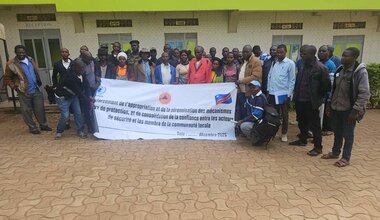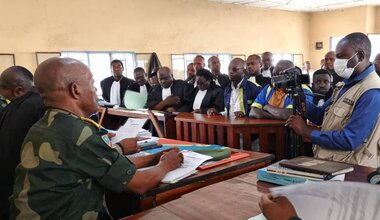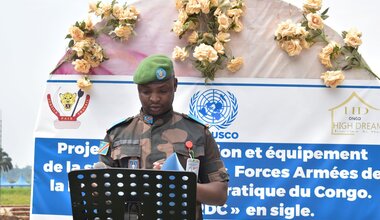Ituri: In Djaiba, Local Population and Internally Displaced Persons Have Every Faith in MONUSCO
“Thanks to MONUSCO peacekeepers we have settled here. They protect us. The day they leave here, we will also have to move to avoid being killed by the Codecos,” said a displaced woman from the Djaiba camp, in the Walendu Djatsi sector, Djugu territory, on September 14, 2022. about 65 km from Bunia, in Ituri. This camp, located a few meters from MONUSCO base, is as large as five football fields and is home to more than six thousand people.
Once a month, "Urafiki meeting" is held, which brings together protection partners, including MONUSCO peacekeepers, the Congolese Army (FARDC), the Congolese National Police (PNC), the National Intelligence Agency of (ANR), heads of groupings, members of the local protection committee (CLP), as well as women leaders from Djaiba and Fataki.
On September 14, 17 participants gathered at MONUSCO military base in Djaiba to discuss the security situation, measures to be taken to prevent threats from Codeco militiamen and the humanitarian situation in the area. On that day, 120 cases of children with Kwashiorkor were reported at Lodha IDP camp, located 3 km from Djaiba.
Patrolling, to deter attackers...
In Djaiba, the Nepalese blue helmets, who took over from their Uruguayan colleagues in 2021, ensure the protection of civilians 24 hours a day, seven days a week and have been fighting the armed groups active in this area for several years.
They organize security patrols day and night, during which they interact with civilian populations to collect security information, but also to get their recommendations in order to step up protection.
The humanitarian-related Information are shared with humanitarian organizations (United Nations Office for the Coordination of Humanitarian Affairs, OCHA, in particular). Every evening, between 7 p.m. and 9 p.m., sometimes 10 p.m., a fresh patrol by blue helmets is organized.
During these patrols, it sometimes happens that blue helmets come to the rescue of passengers in vehicles in distress on a road, intervene in the event of a fire, accompany farmers to their farms where they protect them against attacks from armed groups... Also, during these deterrence patrols, blue helmets do not hesitate to open fire on assailants attempting to launch attacks against civilians, which helps rout the rebels and thus save many human lives.
Civilians’ protection is everyone's business
To better protect civilians, peacekeepers encourage local populations to actively alert MONUSCO to help reduce the threats and violence perpetrated by militiamen. For example, civil society members are urged to denounce the presence of rebels or their movements to MONUSCO and (FARDC and police) security services.
To achieve this, the blue helmets raise local populations' awareness of civilian protection and early warning tools. Indeed, it is the community liaison assistants (CLA) of the Mission’s Civil Affairs section who build the capacity of local partners for their participation and direct involvement in the protection of their communities.
On average, MONUSCO community liaison assistants say they receive ten calls a day, not to mention the ones made by themselves to inquire about the security situation in the area. In the event of alerts, this figure may rise to 30 or 40 daily from the various protection actors. Once these alerts are received, the blue helmets in turn inform the Congolese security services for a proactive intervention which can be joint (MONUSCO/FARDC) or separate operations.
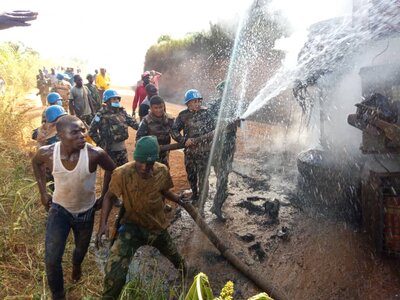
“A specific case, for example, is the one that occurred on May 9 when Codeco militiamen had attacked the site for displaced persons in Lodha, it was 9 p.m. local time. Once the alert was received from the chief of the displaced persons in Lodha, the blue helmets immediately deployed a robust -patrol to stop this attack, which had made it possible to limit the human damage”, explains one of MONUSCO community liaison assistants.
He further said: "upon arriving, a few minutes later, FARDC joined forces and pushed back these rebels who ended up retreating... The fighting lasted all night, until 6-7 a.m. We spent two sleepless nights, because the alert was high," he says, proud to have been part of this team which saved many human lives.
"Let those who do not know what MONUSCO does come here and learn..."
Sabina Ngbasilikale is a female leader in Fataki, responsible for the association AVEK MAENDELEO. She testifies that MONUSCO remains actively engaged alongside the FARDC to ensure the protection of civilians. “Those who are saying MONUSCO has been giving weapons to militiamen are just ignorant, they do not understand and know nothing about the work MONUSCO has been doing. These people are not pro-development and talk as if they were in the desert. We who are here in Djaiba, Fataki, are at peace with MONUSCO. We are well secured. The day MONUSCO will leave here, we, the displaced persons in Djaiba will also leave together with MONUSCO, because we benefit from MONUSCO’s protection”, she explains.
Jean-Vianney Mateso Dz'bo, Djaiba grouping chief said the same thing. According to him, MONUSCO patrols are a barrier to armed groups’ activism in Djugu, in particular Codeco. “MONUSCO has distributed toll-free numbers to encourage the population to alert when there are in trouble, day and night. MONUSCO is available and intervenes whenever there is an alert from the population. The UN troops are supporting our loyalist force, the FARDC. It deploys to watch over the displaced persons’ site in Lodha, which is outside our entity,” he says.
In conclusion: “We are witness to the collaboration prevailing between the community and MONUSCO. Whenever there are problems, MONUSCO organizes meetings to discuss the challenges with the community, and to see how to address them. And we all participate: community leaders, chiefs, locals, women leaders, young people... In any case, we are satisfied with what MONUSCO has been doing, and do express our deep gratitude”.
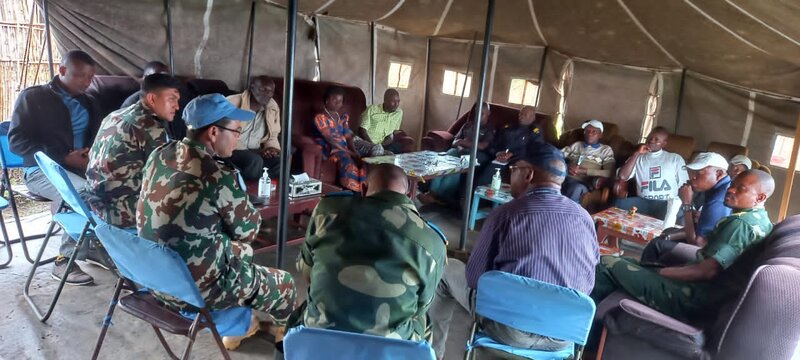
 UN
UN United Nations Peacekeeping
United Nations Peacekeeping




